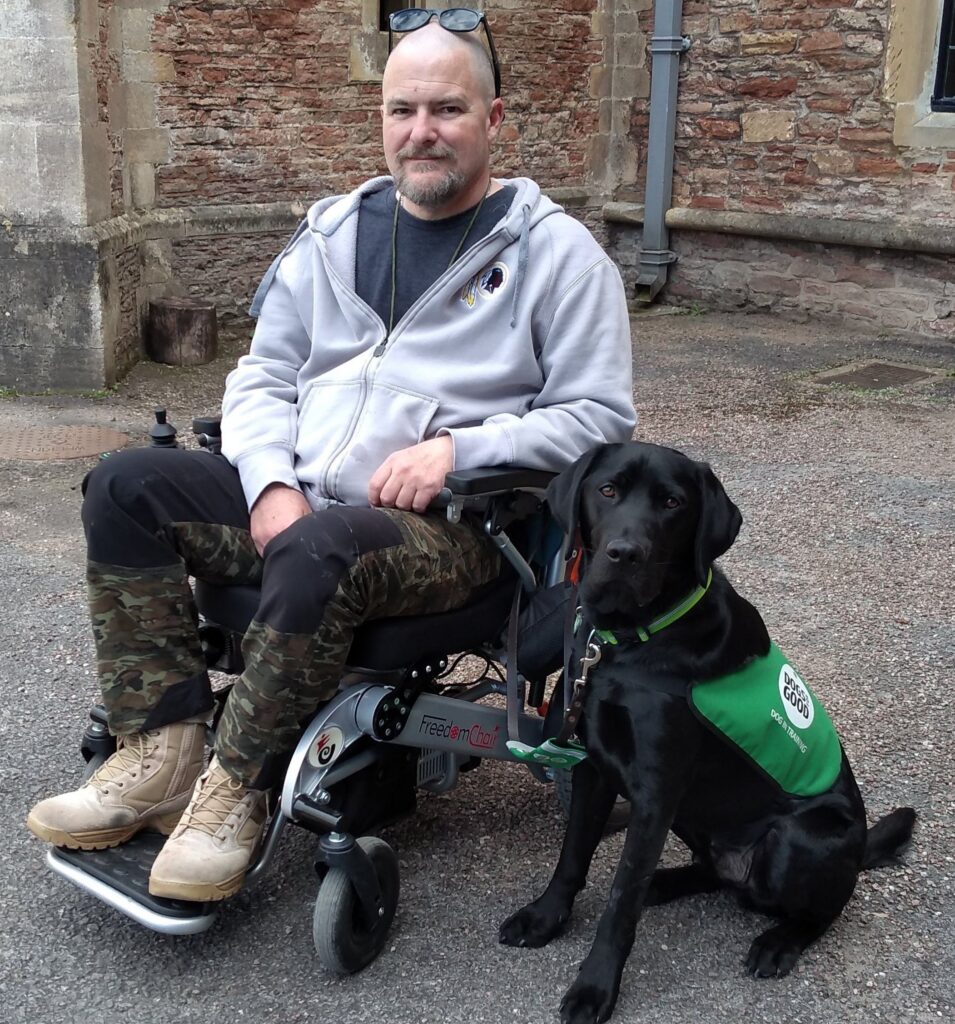Somerset man reveals life changing impact of Dogs for Good assistance dog

A Somerset man has revealed the life-changing impact that his assistance dog from Dogs for Good has made.
Duncan DeLooze (51) from Wells, Somerset, has suffered with chronic pain for most of his life and now uses a wheelchair and crutches to help him get about.
Several stomach operations as a teenager caused back problems and he has shoulder and wrist injuries. To make matter worse a bad fall 15 years ago, from over ten feet high, caused chronic nerve damage to his groin and legs and exacerbated his back problems.
Duncan also has fibromyalgia and a rare type of ‘hemiplegic’ migraine, which mimics having a stroke and paralyses the right side of his body.
These migraines can cause seizures which leave him unable to speak or swallow and he can have as many as 20 to 25 seizures a month which leave him paralysed for a few hours to a couple of days. In rare cases these attacks can be life threatening if his tongue is affected.
He also has arthritis and PTSD after experiencing a childhood trauma, and struggles with depression.
When he saw a news item on TV about Dogs for Good’s assistance dogs, he thought a dog might make all the difference to his life as he or she could carry out everyday tasks for him that he was struggling with.
Dogs for Good is a UK-wide charity that creates life-changing differences for people living with a wide range of disabilities and conditions including autism, physical disabilities, dementia and learning disabilities, through the help of a specially trained dog. The charity’s assistance and community dogs enable people to live more independently.
Every assistance dog is specially trained to help with practical tasks that many people with disabilities find difficult or impossible to do, such as opening and closing doors, helping with dressing and undressing, retrieving items such as mobile telephones or dropped articles like keys or a bag, loading and emptying the washing machine, pressing a pedestrian crossing button and reaching up to shop-counters with items such as a wallet.
Duncan applied to Dogs for Good for an assistance dog and a year later he was matched with a handsome black Labrador called Gibson. They hit it off immediately and quickly formed a very strong bond.
The bond between Duncan and Gibson is now so strong that Duncan says, “Quite often before I’ve even said the words ‘fetch my meds’ Gibson’s half way there already. I then encourage him by telling him to ‘fetch meds bag’ and he’s back in a flash with it.
“The earlier I get my meds the better, as this can stop the hemiplegic migraine from happening. Gibson’s got my medication dozens of time to prevent me having an attack.”
It’s important to note that the relationship between Duncan and Gibson is extraordinary, and that Dogs for Good’s training programme teaches vital core skills, but the dogs are not trained to carry out medical assistance tasks.
Duncan continues: “Gibson also has an incredible amount of empathy for me, he makes my life calmer and more bearable. It’s amazing how just the act of being with him, cuddling and stroking him, can reduce my pain levels.
“At the beginning I was only thinking of having a dog to help me with my physical needs but he helps just as much mentally. I’ve gone from existing to living.”
Jane Pawling, Dogs for Good instructor, said: “Gibson is a clever boy who loves to help.
“He remembers that he got a food reward for fetching Duncan’s meds bag the last time so he continues to do it because he knows he will be rewarded with lots of fuss and a bit of kibble from his daily food allowance
“He fetches Duncan’s medicine bag much faster than Duncan could himself and this reduces the impact of the migraine.”




